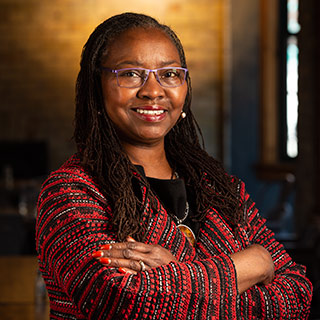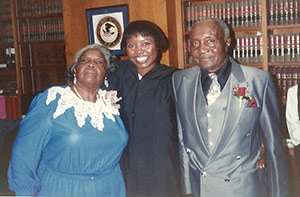Judge Maxine White to put perspective into practice on Appeals Court (VIDEO)
By: Michaela Paukner, [email protected]//March 31, 2020//
Judge Maxine White to put perspective into practice on Appeals Court (VIDEO)
By: Michaela Paukner, [email protected]//March 31, 2020//

“I always thought that I saw a little bit of myself and my family in the sufferings of people who came before us.”
Judge Maxine White brings a compassionate perspective to the Wisconsin Court of Appeals. As the daughter of sharecroppers in rural Mississippi, she grew up with poverty, discrimination and a lack of opportunity.
Despite starting out with less than most, White has overcome social barriers and succeeded in her career, achieving a series of history-making milestones along the way.
She was the first black woman to work as a federal prosecutor for the Eastern District of Wisconsin, the black chief judge of Milwaukee County, and most recently, the first woman of color appointed to the Court of Appeals.
White credits her success and her outlook on life to her parents, who she said always gave their 11 kids unconditional love and acceptance.
“They had this strange magic of making us feel safe and important in a time when we were not safe and society did not think we were important,” White said.
As a judge, White presides over cases with her parents’ lessons in mind. She looks for ways to support defendants, some of whom experience the same barriers White and her family did.
“I tried to do the best that I could to understand how the system could help them, even if it meant inside of a system, rather than in the community,” White said.
White recently sat down with the Wisconsin Law Journal to talk about her life and career, her new role as an appellate judge and her vision for the future of Wisconsin’s judiciary.
Wisconsin Law Journal: How has your experience in the Milwaukee County Circuit Court prepared you for hearing cases in the Court of Appeals?
Judge Maxine White: What my trial court experience and my federal prosecutor experience led me to conclude is that we’re not just looking at words on a page. We’re looking at the lives of people. We’re also looking at the business of corporations, individuals and entities that rely upon us to get it right.
I had a great job as a chief judge. I was able to hire good people; hire good vendors and contractors; help, lead, guide and work with the best judiciary I think we’ve ever had. It’s a dream administrative opportunity. I tried to be clear as an administrator about what governed my opportunity to provide a response favorable to someone and what governed my opportunity to provide the accurate response that might not have been favorable, whether it was in an administrative capacity or as a trial judge.
WLJ: How will you apply those guidelines as an appellate judge?

White: I use those same principles. Give people the time that they need to explain because they want to know that they’ve been heard. As an appellate court judge, I do the same thing. Give attention to detail. Hopefully when they see my written decisions, they will contain an acknowledgment of the position that they took. They will also contain the position of the other side, and they would get a good explanation of the outcome that I signed my name to as a decision reviewing the lower court. It’s really an opportunity to let people know in your work that you have seen them, that you have heard them, and you’ve given special attention and detail to prescribing an outcome that’s supported either by law or some policy established by a higher court, so that they can understand the outcome even if they don’t agree with it.
WLJ: Why is it so important to have a diverse judiciary?
White: Diversity is one of the bedrock principles of our nation. When this nation was established on the shores of what we now call the United States of America, we had a variety of people with a variety of backgrounds who were struggling with what to do and how to form this nation. We are a land of immigrants. Some of us came here unwillingly by force and torture, like the African-Americans. Others came by choice looking for a better land. Everybody who came here thought this would be an opportunity to live differently.
I’ve been on the bench over 27 years, and there were days when I walked down the hall, when but for me and a couple of other judges, appointed by Tommy Thompson substantially, they were all white. Most of the people in the hallways were black, brown or other non-Europeans. Regardless of the outcome, people must come in with the feeling that they have a chance to be heard, and that they see someone like them. Rejection is more acceptable when you believe that the person delivering it and the system delivering it understand what you were trying to get to and gave you the best outcome possible, even if it might have been a loss.
WLJ: What can we do to improve diversity in Wisconsin’s legal industry?
White: One way to improve it is to have a diverse judiciary that represents the people who come before us. That gives people the opportunity to believe when we say we really care and this is the best we can do. These are the outcomes anybody would receive, regardless of race, color, creed. I think they would have a stronger and more satisfying respect for the judiciary than people experience now.
I think everyone is working harder to raise the bar on what each of us should be doing to make everybody feel as though they have a chance to have a good life in America. We have a duty to provide opportunities to others through either our service or our resources. I see a lot of people working really hard to try to make that happen. They get up every day and in the face of a lot of bad things that seem to stereotype different folks, a lot of good people keep moving through their paths every day, still determined to unite as many good people around good interests as they possibly can.
Legal News
- Some State Bar diversity participants walk away from program
- Wisconsin court issues arrest warrant ‘in error’ for Minocqua Brewing owner
- Iranian nationals charged cyber campaign targeting U.S. Companies
- Facing mostly white juries, are Milwaukee County defendants of color truly judged by their peers?
- Milwaukee Mayor speaks in D.C. Tuesday at White House water summit
- Chicago man sentenced to prison after being caught with ‘Trump Gun’
- FTC bans non-competes
- Gov. Evers seeks applicants for Dane County Circuit Court
- Milwaukee man charged in dismemberment death pleads not guilty
- Democratic-led states lead ban on the book ban
- UW Madison Professor: America’s child care crisis is holding back moms without college degrees
- History made in Trump New York trial opening statements
WLJ People
- Power 30 Personal Injury Attorneys – Russell Nicolet
- Power 30 Personal Injury Attorneys – Benjamin Nicolet
- Power 30 Personal Injury Attorneys – Dustin T. Woehl
- Power 30 Personal Injury Attorneys – Katherine Metzger
- Power 30 Personal Injury Attorneys – Joseph Ryan
- Power 30 Personal Injury Attorneys – James M. Ryan
- Power 30 Personal Injury Attorneys – Dana Wachs
- Power 30 Personal Injury Attorneys – Mark L. Thomsen
- Power 30 Personal Injury Attorneys – Matthew Lein
- Power 30 Personal Injury Attorneys – Jeffrey A. Pitman
- Power 30 Personal Injury Attorneys – William Pemberton
- Power 30 Personal Injury Attorneys – Howard S. Sicula











